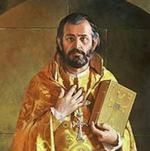Bishops need to earn their priests’ confidence
By Phil Lawler ( bio - articles - email ) | Oct 22, 2025
Every now and then, when I have trouble choosing a topic for commentary, I consult the CatholicCulture archives, to see what I was writing five or ten or fifteen years ago around this time of year. So it was that today I found a piece that I had written in October 2017: The crisis of pastoral leadership.
That article, in turn, was prompted by a message from a friend, a priest in a relatively strong American diocese, who complained about the sort of directives he received from the chancery. “Everything is administrative, psychological, or sociological—or simply problem-avoidance,” he said. “Very little is religious or truly pastoral, stressing the urgency of the salvation of souls.”
Enlarging on that theme, I added:
For that matter, only rarely (and again, vaguely) are priests urged to attend more carefully to their own spiritual lives. Surveys show that a solid majority of American priests are “happy” as priests. Yet surveys also show that less than half are regular in their practice of the Divine Office. Those surveys suggest that nearly half of our priests could be in a state of serious sin for ignoring their breviaries, but still happy about their status. That is a sign of a spiritual crisis: an indication of an urgent need for pastoral leadership.
If most priests are happy as priests, that in itself is a good thing. But I wondered at the time, and I still wonder, what is it about their priestly life that makes them happy? (Is it their life of prayer, which many of them are neglecting?) For that matter, where are parish priests being encouraged to find their happiness? If the advice they receive from their bishops—often in impersonal memos, relayed by chancery bureaucrats—is predominantly “administrative, psychological, or sociological,” how does that guidance influence them?
The important report released last week from the National Study of Catholic Priests offers another perspective on this question. Only 52% of the priests who were surveyed said that they trusted their own bishop. That is a chilling statistic. And it cannot be written off as a reflection of local grousing about diocesan affairs; when priests were asked whether they trusted the American hierarchy in general, only 27% responded positively. So priests apparently are more likely to trust their own bishop than other bishops, and yet barely more than half of our priests trust their own bishop.
What could account for this dangerous lack of confidence? No doubt a great deal reflects the damage done by the sex-abuse scandal and the institutional response, which have led good priests to fear that they could be suspended indefinitely from ministry, and live the remainder of their lives under a cloud of suspicion, on the basis of one fraudulent accusation.
Yet it is not the prospect of a false accusation that worries priests the most; it is the perception that if they are accused, their bishop will not defend them. So it is understandable that in the National Study results, the priests most likely to report trust in their bishops were those who said that the bishop “cares about me.”
A bishop who cares about his priests—about their spiritual formation, their personal lives, their successes and failures, their joys and their worries, will inspire their confidence. Moreover that sort of pastoral leadership is bound to prove contagious. The priest who is happy and confident in his ministry will care about his parishioners in the same way.
The danger, for both the bishop and the parish priest, lies in the routinized administrative approach. The bishop expects his priests to administer the sacraments, maintain the parish property, and comply with diocesan policies. The priest expects his parishioners to come to Mass (at least occasionally), contribute to the collections, and avoid squabbles with the parish staff. If that is all they expect, sadly enough, that may be all they get.
All comments are moderated. To lighten our editing burden, only current donors are allowed to Sound Off. If you are a current donor, log in to see the comment form; otherwise please support our work, and Sound Off!
-
Posted by: philtech2465 -
Oct. 23, 2025 10:45 PM ET USA
feedback's advice is well taken. I remember Phil's article about Fr Paul "Diogenes" Mankowski's advice to new bishops included a warning that every diocese has a network of gay priests. I have to wonder: how does a bishop find and root out those priests? For that matter, how does the Bishop of Rome do it, and root out the "Lavender Mafia"?
-
Posted by: feedback -
Oct. 23, 2025 6:04 AM ET USA
The Vicar of Christ needs to use his supreme authority and address head-on the Number One problem in the Church today: ordinations of homosexuals. They destroy priestly fraternity, create their own cliques of support, and repel authentic vocations. Men with intrinsically disordered proclivities are, very simply, unfit for the Holy Orders.





